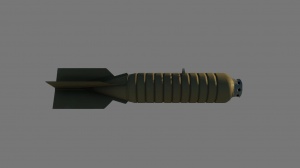Difference between revisions of "SD10C (10 kg)"
(→Pros and cons) (Tag: Visual edit) |
|||
| (2 intermediate revisions by 2 users not shown) | |||
| Line 44: | Line 44: | ||
=== Effective damage === | === Effective damage === | ||
| − | <!-- | + | <!--''Describe the type of damage produced by this type of bomb (high explosive, splash damage, etc)''--> |
| − | ''Describe the type of damage produced by this type of bomb (high explosive, splash damage, etc)''--> | + | This bomb has an explosive power comparable to a 3-inch (76 mm) HE shell. Barely enough to destroy anything, even armoured cars and open vehicles, in which case multiple SD10C bombs are needed. The bomb lead indicator compensates for the low explosive power of the bomb in arcade battles by allowing for accurate drops. |
| − | This bomb has an explosive power comparable to | ||
=== Comparison with analogues === | === Comparison with analogues === | ||
| − | + | Because of its small size, there are no analogues. | |
== Usage in battles == | == Usage in battles == | ||
<!-- ''Describe situations when you would utilise this bomb in-game (vehicle, pillbox, base, etc)'' --> | <!-- ''Describe situations when you would utilise this bomb in-game (vehicle, pillbox, base, etc)'' --> | ||
| − | Because of the | + | Because of the low explosive mass, it is only effective against extremely lightly armoured targets, such as the [[GAZ-AAA (4M)]], or the [[15cm sIG 33 B Sfl]]. |
=== Pros and cons === | === Pros and cons === | ||
| Line 62: | Line 61: | ||
* Light and easy for new players to learn how to use ground attack weapons | * Light and easy for new players to learn how to use ground attack weapons | ||
* Effective against soft targets (AA, Artillery, open vehicles) | * Effective against soft targets (AA, Artillery, open vehicles) | ||
| − | |||
'''Cons:''' | '''Cons:''' | ||
| − | * | + | * Too small to inflict damage to armoured targets (pillboxes, tanks) |
== History == | == History == | ||
| Line 88: | Line 86: | ||
* [http://www.warbirdsresourcegroup.org/LRG/sd10c.htm <nowiki>[warbirdsresourcegroup.org]</nowiki> SD 10C Antipersonnel Bomb] | * [http://www.warbirdsresourcegroup.org/LRG/sd10c.htm <nowiki>[warbirdsresourcegroup.org]</nowiki> SD 10C Antipersonnel Bomb] | ||
| − | {{ | + | {{AP bombs}} |
[[Category:Suspended armaments]] | [[Category:Suspended armaments]] | ||
Latest revision as of 18:48, 14 August 2024
Contents
Description
The 10 kg SD10C was a German anti-personnel bomb, mainly used as a sub-munition in cluster bombs.
The grooves seen on the bomb's body ensured good fragmentation, similar to the Mk 2 "pineapple" hand grenade of the US.
Vehicles equipped with this weapon
General info
| Bomb characteristics | |
|---|---|
| Mass | 10 kg |
| Explosive mass | 0.75 kg |
| Explosive type | TNT |
| TNT equivalent | 0.75 kg |
| HE max penetration | 11 mm |
| Destruction radius | N/A |
| Fragment dispersion radius | 16 m |
Effective damage
This bomb has an explosive power comparable to a 3-inch (76 mm) HE shell. Barely enough to destroy anything, even armoured cars and open vehicles, in which case multiple SD10C bombs are needed. The bomb lead indicator compensates for the low explosive power of the bomb in arcade battles by allowing for accurate drops.
Comparison with analogues
Because of its small size, there are no analogues.
Usage in battles
Because of the low explosive mass, it is only effective against extremely lightly armoured targets, such as the GAZ-AAA (4M), or the 15cm sIG 33 B Sfl.
Pros and cons
Pros:
- Light and easy for new players to learn how to use ground attack weapons
- Effective against soft targets (AA, Artillery, open vehicles)
Cons:
- Too small to inflict damage to armoured targets (pillboxes, tanks)
History
Examine the history of the creation and combat usage of the weapon in more detail than in the introduction. If the historical reference turns out to be too long, take it to a separate article, taking a link to the article about the weapon and adding a block "/History" (example: https://wiki.warthunder.com/(Weapon-name)/History) and add a link to it here using the main template. Be sure to reference text and sources by using <ref></ref>, as well as adding them at the end of the article with <references />.
Media
Excellent additions to the article would be video guides, screenshots from the game, and photos.
See also
External links
| Armour-piercing bombs | |
|---|---|
| USA | |
| 1,000 lb | A.P. AN-MK 33 |
| 1,600 lb | AN-Mk 1 |
| Germany | |
| 10 kg | SD10C |
| 50 kg | SD50 |
| 70 kg | SD70 |
| 500 kg | PC500 |
| 1,000 kg | PC1000 |
| 1,400 kg | PC 1400 X* |
| 1,600 kg | PC1600 |
| USSR | |
| 220 kg | BRAB-220 (1930) |
| 250 kg | BRAB-250 |
| 500 kg | BRAB-500 (1938) · BRAB-500 |
| 1,000 kg | BRAB-1000 |
| Britain | |
| 500 lb | S.A.P. Mk.II |
| 2,000 lb | A.P. Mk.I |
| Japan | |
| 500 kg | Number Type 2 50 Model 1 GP(SAP) |
| 800 kg | Navy Type 99 Number 80 AP |
| 1,500 kg | Navy Type 3 Number 150 AP |
| Italy | |
| 160 kg | A.P 160 |
| 630 kg | 630 P.D. |
| * Guided bomb | |
| See also | List of high-explosive, unguided, free-falling bombs · List of guided bombs · List of retarded bombs |




